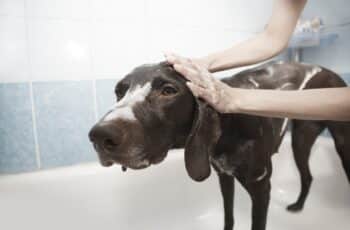
Many dog owners have noticed their dogs excessively scratching themselves. Canine skin diseases are not unusual, but allergies are the most common cause of itching in dogs. Your pet might be itching because of fleas or parasites, an allergy to food, environmental allergens, or contact dermatitis. If you have recently changed your dog’s diet, this could also be the cause. Here are some tips to make your pet stop itching and relieve him from this uncomfortable problem.
It is usual for dogs to chew, lick, and scratch for various reasons. Hot spots are red, moist, irritated areas on your dog’s body caused by the constant chewing, licking, scratching, or rubbing. One of the first signs that your dog’s skin needs attention is the appearance of hot patches on its body. Acute moist dermatitis, often known as “hot spots,” can appear anywhere on your dog’s body, but the head, chest, or hips are the most common places to see them. Hot spots may quickly grow in size and become unbearably painful for dogs because of their habit of scratching, biting, or licking at an inflamed region.
Common Reasons Why Dogs are Itching
Allergies
When it comes to excessive scratching in dogs, dietary or environmental allergens, such as mold or pollen, are frequently blamed. Contact dermatitis can also occur in dogs when they come into contact with irritants like insecticides or soap.
Parasites
Fleas, ticks, and mites are among the most prevalent causes of obsessive dog licking, chewing, or scratching. Ticks may easily be seen with the naked eye, while fleas and mites are invisible until substantial infestation. Do not, under any circumstances, make the mistake of assuming that your dog is free of parasites simply because you cannot see them.
Itchy Skin
Dry skin in dogs can be caused by various circumstances, including cold temperatures and fatty acid deficiency. Constant scratching or licking may be your pet’s way of relieving their discomfort.
How Can I Make My Dog Stop Itching?
Try These Naturopathic Treatments!
Most canine skin disorders may be treated safely at home with these remedies. Still, you should always check with your veterinarian before administering any of these treatments to your pets. The most effective therapy for your dog’s itchy skin depends on a correct diagnosis. After consulting with your veterinarian, you are free to experiment with any or all of these solutions. They are all safe and natural.
Coconut Oil
Coconut oil’s antibacterial and antifungal characteristics have made it a popular ingredient in many natural cosmetic treatments. In addition, it is an excellent moisturizer for dogs since the oils may permeate the fur and reach the skin directly via the coat. Applying coconut oil directly to the affected area can help dogs with skin conditions such as eczema, allergies, yeast infections, and even bites and stings from insects. Massaging the oil into your dog’s coat and skin will offer immediate relief from dry skin and improve their coat as well!
Soaks with Chamomile and Herbal Tea
Calendula, chamomile, and green tea all offer soothing and cooling characteristics that can be used to treat skin irritations. If your dog has hot, itchy spots on their skin that are prone to be rubbed, these soaks may help. If your dog is scratching himself to death from head to tail, try steeping a few tea bags in warm water for three minutes to soothe his itching. Allow your dog to soak for at least 5 minutes after removing the tea bags from the bath. Alternatively, you may use about two cups of boiling water to steep 1 or 2 tea bags for smaller itching regions. Pour the cooled tea over your dog’s skin and allow it to drip dry without washing it.
Oat Bath
Oatmeal is a tried-and-true cure for dry, itchy skin, and it’s safe to use on dogs, too! Oatmeal is a common component in hypoallergenic shampoos for dogs due to its ability to calm and combat inflammation.
Make a powdered oatmeal mixture and add it to your dog’s warm bath. Regardless of the cause of irritation, oatmeal can help to calm it within 10 to 15 minutes. Moreover, it is non-toxic, so your pet may safely lick it off throughout the lengthy bathing process.
Plain Unsweetened Yogurt
There are several health benefits to giving your dog plain, sugar-free yogurt. Your dog’s digestive tract might cause fungal infections and skin irritation. Dogs with specific rashes or allergies will benefit from this treatment. Small dogs should be fed 1 tsp of yogurt a week, while you should feed large dogs two teaspoons. In addition to being delicious as a stand-alone treat, yogurt has several health benefits for dogs.
A 50/50 Mixture of Apple Cider Vinegar (ACV) and Water
When it comes to dry, itchy skin, ACV is a safe, natural solution. Apple cider vinegar is an excellent remedy for poison ivy thanks to its antibacterial and antifungal properties, but it should never be applied to open skin. A stinging sensation may be felt when this solution is applied to a dog’s irritated skin. Using a spray bottle half-full of water and half-full of apple cider vinegar can help you prevent splashing vinegar inside any open wounds.
Frequently Asked Questions
Are fleas and other bugs contagious between dogs?
It’s unclear if fleas and other parasites may be transmitted between dogs.
Although they can jump large distances and cheerfully hop to another host to infect, fleas are exceptionally infectious because of the developing eggs they lay. While fleas and mites are equally contagious, ticks are far less likely to spread to new hosts.


